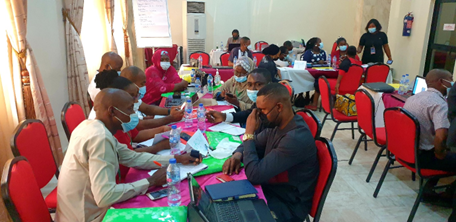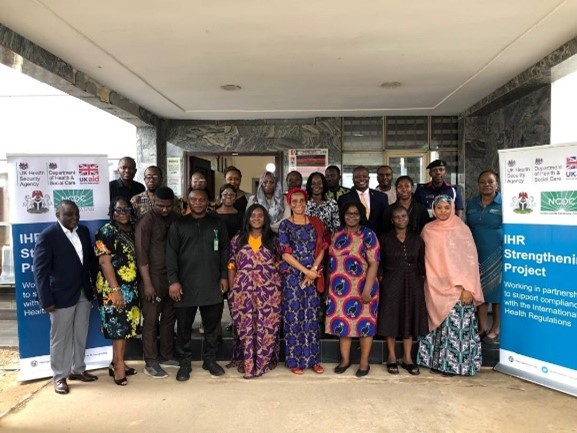
In April 2024, Nigeria Centers for Disease Control (CDC) reported an outbreak of multiple suspected heavy metal poisonings in Sokoto and Zamfara states. This outbreak led to NCDC identifying areas for strengthening the country’s response to future chemical events.
Nigeria CDC requested the UK Health Security Agency’s (UKHSA) International Health Regulations Strengthening Project (IHR-SP) to support with rapid training on the effective detection, monitoring and management of environmental and poisoning incidents. This request built on training already conducted by IHR-SP chemical experts for Nigeria’s Rapid Response Team (RRT) and other relevant stakeholders in January 2022 and September 2023.
A two-day refresher training was developed and delivered in hybrid format (combination of virtual and in-person) by IHR-SP in June 2024, to ensure timely and impactful capacity strengthening for partners working on ongoing and potential future emergency responses. With input from Nigeria CDC on identified learnings and knowledge gaps, the training focussed on providing a structured (non-incident specific) approach to chemical event response. Key areas included developing conceptual site models, risk assessment, environmental sample collection, and the use of toxicological databases in incident response.
The effectiveness of the training was emphasised in participants’ feedback, noting their intent to apply the learnings and updated knowledge in their roles:
“My job has an aspect of chemical event, this training will go a long way in helping me respond to chemical incidents.”
“[I will] apply the knowledge and skill during investigation of incidents. It will help me in responding appropriately and adequately to chemical incidences when the need arise.”
This training demonstrates IHR-SP’s flexibility to support to requests made at short notice to support capacity strengthening which can subsequently be of benefit to partners working on emergency response, as well as ongoing and long-term work to build preparedness for future responses. The IHR-SP Chemicals team also recognises the importance of sustainable training and is planning a RRT train-the-trainer workshop working with Nigeria CDC later this year. This will ensure that knowledge gained during this workshop is transferred from national level to subnational (state) level.
Longstanding partnership with Nigeria CDC on chemical events preparedness
IHR-SP’s Chemicals team has been partnering with Nigeria CDC to deliver chemical events training exercises for Nigeria’s RRT since 2022.
This initiative began with a foundational course on Chemical Hazards and Public Health in January 2022, which included participants from various organisations across relevant Ministries, Departments and Agencies.
In September 2023, the IHR-SP Chemicals team co-delivered with Nigeria CDC more targeted and comprehensive training aimed at equipping the RRT with the skills and knowledge needed for effective chemical event investigation and response. This included practical sessions on environmental epidemiology and responding to incidents of potentially unknown chemical aetiology. The delegates trained were selected based on their relevant expertise and ability to be deployed at short notice to effectively investigate, respond to, and manage outbreaks of public health importance. A wide range of trainees attended, including officers from Nigeria CDC, Nigeria Security and Civil Defense Corps (NSCDC), National Environmental Standards and Regulations Enforcement Agency (NESREA), Federal Ministry of Health & Social Welfare (FMoH&SW), Federal Ministry of Environment (FMEnv), Nigeria Police Force (NFP), and Office of the National Security Adviser (ONSA).
This work aligns with taking steps on Nigeria’s identified action point in the National Action Plan for Health Security (NAPHS) for “Strengthening inter-agency chemical emergency response team in collaboration with Emergency Operation Centre of Nigeria Centre for Disease Control and Prevention (NCDC)”.
IHR-SP will continue to work with Nigeria CDC in recognition of its mandate of strengthening technical capability to create effective response to public health concerns and unusual incidents, such as those caused by chemical events or unknown etiology.

